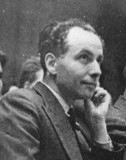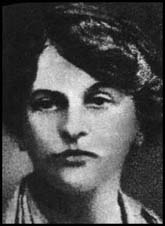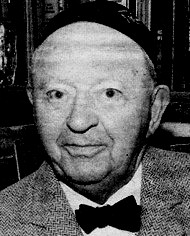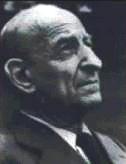Ar
Aragon, Louis (1897-1982)
 French poet and novelist.
French poet and novelist.
After beginning his writing life and career among the Dadaists and Surrealists, in 1927 Aragon joined the French Communist Party (PCF), remaining a faithful member till his death. Aside from his voluminous production of prose and poetry, much of the latter inspired by his love for his wife Elsa Triolet, he held numerous positions in the PCF, editing party journals like Commune, Ce Soir and les Lettres Franšaises. Elected member of the Central Committee of the PCF in 1950, he remained a member till his death, despite his anger and horror at the Soviet invasion of Czechoslovakia in 1968. Long rumored to be homosexual, after Elsa Triolet’s death in 1970 he ceased to exert much energy in hiding his proclivities and his male companion was at his bedside when he died.
Further Reading: Louis Aragon Archive.
Arendsee, Marta (1885–1953)
Worked in bookshops, member of SPD (Sozialistische Partei Deutschlands, Social-Democratic Party) in 1906, organiser of women’s movement from 1907; in opposition in 1914, member of Niederbarnim group, delegate to Berne in 1915. Member of USPD in 1917 and VKDP (Vereinigte Kommunistische Partei Deutschlands/United Communist Party of Germany) in 1920. On editorial staff of Die Kommunistin from 1922, elected to trade-union commission at Leipzig. Close to KPD (Kommunistischen Partei Deutschlands/German Communist Party) Right, worked in Workers’ International Relief. Arrested in 1933, released in 1934, emigrated to USSR with her husband Paul Schwenk, who was arrested there; worked for Soviet radio in Moscow. Returned to Germany in 1945, member of leadership of SED until 1947.
Aristotle 384-322 BC
Encyclopaedic philosopher and founder of the science of logic and several other branches of science. Marx called him the greatest thinker of antiquity; wavered between materialism and idealism; recognised four "prime causes" - matter (passive possibility of becoming), form (essence, activity), the beginning of motion and aim; regarded nature as successive transitions from "matter" to "form" and back; saw logical forms as forms of Being, a view which is close to consistent materialism; in the theory of knowledge distinguished between Established (apodictic) and Probable (opinion) truth, connected by Language.
See Hegel on Aristotle.
Arkwright, Richard (1732-1792)
English entrepeneur who was accused of stealing several patents.
Armand, Emile (1872-1963)
Born Ernest-Lucien Juin and son of a Communard, he joined the Salvation Army at 18, resigning from the group in 1897. From Christian humanist he developed into a Christian anarchist, strongly influenced by Tolstoy.
By 1902 he was a self-proclaimed libertarian communist, but quickly became one of the era’s most important individualist anarchists.
He edited “L’En-Dehors’ from 1922-1939, and collaborated with Sebastien Faure on the “Encyclopedie Anarchiste.”
See Emile Armand Archive.
Armand, Inessa (1874-1920)
 Inessa Armand, the daughter of an actor, was born in Paris on 8th May, 1874. Her father died when she was only five and she was brought up by an aunt living in Moscow.
Inessa Armand, the daughter of an actor, was born in Paris on 8th May, 1874. Her father died when she was only five and she was brought up by an aunt living in Moscow.
At the age of nineteen she married Alexander Armand and together they opened a school for peasant children. She also joined a charitable group helping destitute women in Moscow.
When the authorities refused her permission to establish a Sunday School for working women, Armand began to question what social reformers could achieve in Russia. In 1903 she joined the illegal Social Democratic Labour Party. Armand distributed illegal propaganda and after being arrested in June, 1907, she was sentenced to two years internal exile in Siberia.
On her release Armand left Russia and settled in Paris where she met Lenin and other Bolsheviks living in exile. In 1911 Armand became secretary for the Committee of Foreign Organizations established to coordinate all Bolshevik groups in Western Europe.
Armand returned to Russia in July, 1912, to help organize the Bolshevik campaign to get its supporters elected to the Duma. Two months later she was arrested and imprisoned for six months. On her release in August, 1913, she went to live with Vladimir Lenin and Nadezhda Krupskaya in Galicia. She also began work editing Rabotnitsa (Women Worker).
Armand was upset that many socialists in Europe supported the war effort. She joined Lenin in helping to distribute propaganda that urged Allied troops to turn their rifles against their officers and start a socialist revolution. In March, 1915, Armand went to Switzerland where she organized the anti-war International Conference of Socialist Women.
On the 1st March, 1917, Nicholas II abdicated leaving the Provisional Government in control of the country. The Bolsheviks in exile were now desperate to return to Russia to help shape the future of the country. The German Foreign Ministry, who hoped that their presence in Russia would help bring the war on the Eastern Front to an end, provided a special train for Armand, Vladimir Lenin and 26 other revolutionaries to travel to Petrograd.
After the October Revolution Armand served as an executive member of the Moscow Soviet. Armand was a staunch critic of the Soviet government's decision to sign the Brest-Litovsk Treaty.
In February, 1919, Armand was part of the Russian Red Cross Mission to repatriate Russian prisoners of war.
On her return to Petrograd, she became director of Zhenotdel, an organization that fought for female equality in the Communist Party and the trade unions. She also chaired the First International Conference of Communist Women in 1920. Soon afterwards she contracted cholera and died at the age of forty-six.
From Spartacus Schoolnet.
Arnot, Robin Page (1890-1986)
 Robin Page Arnot was born in 1890 at Greenock. His father was the editor of the Greenock Telegraph and Clyde Shipping Gazette. He went to Glasgow University where he helped to form the University Socialist Federation in 1912.
Robin Page Arnot was born in 1890 at Greenock. His father was the editor of the Greenock Telegraph and Clyde Shipping Gazette. He went to Glasgow University where he helped to form the University Socialist Federation in 1912.
Robin Page Arnot was closely connected with the Labour Research Department from its beginnings. In 1912 the Fabian Beatrice Webb had established a Committee of Enquiry into “The control of industry in the state of tomorrow”. One of the volunteers attracted to the project was Arnot. The committee soon turned into the Fabian Research Department and in 1914 Arnot became its full-time secretary, a post he held until 1926.
Arnot was called up to fight in the war in 1916. He refused to go, being opposed to war and was imprisoned for two years in Wakefield as a conscientious objector. When he was released in 1918 he returned to his former post as Secretary of the Research Department which had by then changed its name to the Labour Research Department, having become an independent ‘fact-finding body for the trade union and labour movement’. In 1919 the miners demanded higher wages, shorter hours and nationalisation of the mines. The government established a Committee of Enquiry and the Miners’ Federation asked the LRD for help. Arnot assembled evidence on their behalf and publicised the miners’ cause. Arnot, together with H. H. Slesser, the Federation legal advisor, drafted the Mines Nationalisation Bill which was presented to the Royal Commission set up by the government. During the railway strike later that year, Arnot and the LRD organised publicity for the railwaymen.
Arnot was one of the founder members of the Communist Party in 1920, as was his second wife, Olive. Robin Page Arnot was also a member of the Party’s Central Committee and as such was arrested under the 1797 Incitement to Mutiny Act in 1925 in the run up to the General Strike and spent six months in jail. He was released on the eve of the strike and helped to form the Northumberland and Durham Joint Strike Committee. He later returned to the LRD as Director of Research and wrote a book on the general strike.
Arnot was the first Principal of the Marx Memorial Library from 1933 and from 1949-1975 he wrote a famous 6-volume series on the history of the miners. He was also the author of a two-volume Short History of the Russian Revolution (1937). He was elected to the LRD’s Executive in 1938 and was re-elected every year until 1976 when he was made Honorary President. He was also a contributor and working editor for Labour Monthly, the journal founded by R. Palme Dutt, until its last issue in March 1981. Arnot died in 1986 aged 95.
From Graham Stevenson.
Further Reading: R. Page Arnot Archive.

Aron, Raymond (1905-1983)
The son of a Parisian jurist, Aron was brilliant student and a natural academic. His family was Jewish, and Aron fled the country when the Vichy regime came in, to spend the war years with General de Gaulle’s Free French forces. Returning to France after the war, he became a professor of sociology, while pursuing a second career as an opinion journalist. He is probably best known in the English-speaking world for his book The Opium of the Intellectuals, first published in English translation in 1957. Aron died in 1983.
Artelt, Karl (1890–) .
Metalworker member of SPD (Sozialistische Partei Deutschlands, Social-Democratic Party) in 1908. Led mutiny in Kiel and Baltic sailors’ council in November 1918. Member of USPD, leader of councils in Brunswick in 1919. Member of USPD Left, in VKDP (Vereinigte Kommunistische Partei Deutschlands/United Communist Party of Germany) in 1920. Occupied various secondary responsibilities in KPD (Kommunistischen Partei Deutschlands/German Communist Party); veteran of SED, lived in DDR.
Arya, Raj Narayan (1926– present)
Born in a village in Ghazipur District (Uttar Pradesh), son of Sri Prayag Lal. Educated high school in Gonda, K.P. Inter College in Allahabad, and Allahabad University. Active in local Students’ Congress. Jailed during the August 1942 struggle, along with his father, uncle and two cousins. Joined Bolshevik Leninist Party of India, 1944. Moved to Kanpur, 1946, and worked as chemist and union leader at the Royal Ordnance Factory, 1946-47. Arrested during Kanpur strike, April 1947. Secretary, Suti Mill Mazdoor Sabha, 1948-84. Delegate to BLPI conferences, 1947 and 1948. Entered SP with BLPI, 1948. Joined SP (Loyalists), 1952; elected member of its National Executive. Founder, Socialist Prakashan (publishing house), Kanpur. Central Committee, RCPI, elected 1960. Editor, Mazdoor Kisan Kranti [Kanpur], 1973-84. Member, Revolutionary Socialist Party, 1980-89. Founding member of Revolutionary Socialist Party Marxist. Founded Socialist Revolutionary Group and published News and Views (2003). Author: Problems of Minorities (Urdu), Caste System Through History and Present Tasks: A Marxist View , Brahmin and Bra hminism: A Historical Survey (2001), a 3-volume biography of Trotsky in Hindi, a book of poems dedicated to his wife (2007), and Marxist Critics of Shakespeare, 1950-75 (unpublished thesis). Retired as Senior Lecturer in English, Pandit Prithinath College, Kanpur, 1984. Resides in Allahabad.
Compiled by Charles Wesley Ervin